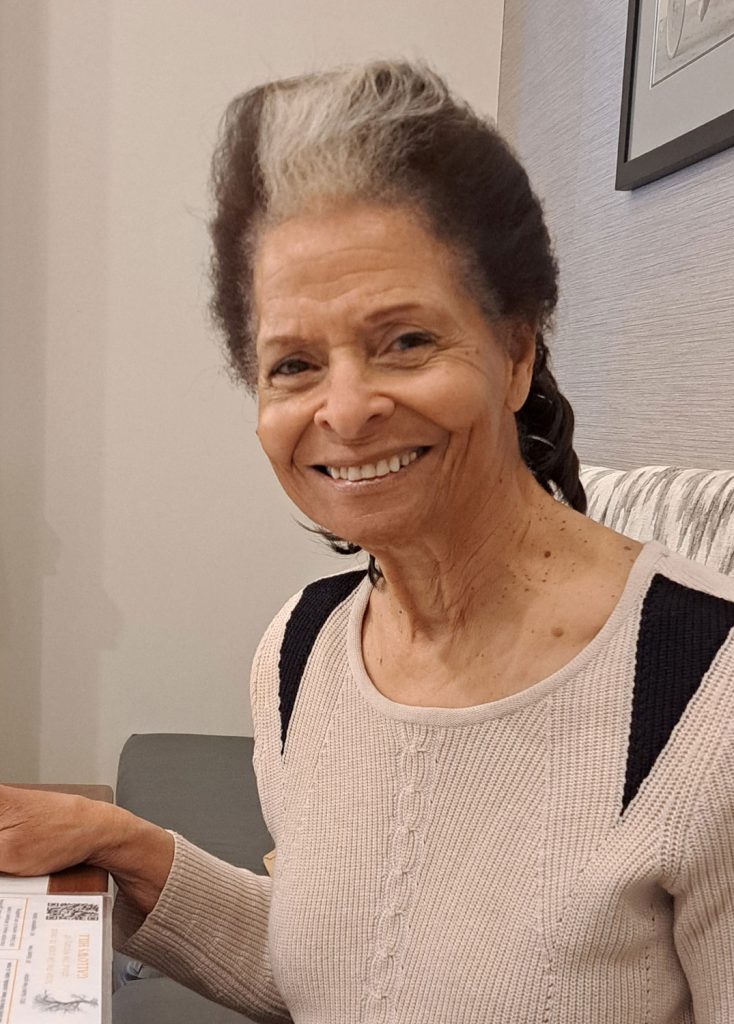On Mother’s Day 2024, a small slim figure with a dramatic white streak in the front of her dark hair adjusted her backpack, picked up her walking poles, and strode out of her Charlottetown, PEI (Prince Edward Island) hotel, heading west. Some 33 days and 435 miles later, striding in from the east, she returned to her starting point, having circumnavigated PEI — Canada’s smallest province — on foot.
This would be a great achievement for most people — but not for Barbados-born octogenarian Betty Hope-Gittens. One might be excused for thinking it was just another notch on her belt. Five years earlier (“when I was a youngster”, she chuckles), Hope-Gittens had walked the legendary Camino de Santiago — a 498-mile trek over far more challenging terrain.
On both occasions, the aim was to fundraise for one or another of her numerous charitable causes. “One person can make a difference,” she insists.
She proved this in 2019, when her Camino walk raised CND$225,000 (roughly US$166,000) for 13 not-for-profit elder care homes in Ottawa, where she lives, and one in Barbados. “All the money that I raised in Barbados stayed there,” she explains. It went to St Phillip District Hospital to purchase beds, wheelchairs, and other necessities for indigent seniors.
“Betty is very determined,” recalls her sister, Lady Denise Douglas. “As a child, she had a mind of her own; she did her own thing. She always got what she wanted.” (She adds, sotto voce, “She was very spoiled!”)
Rosemary Betty Hope was born in 1939, in St Michael, Barbados. Pretty, popular and headstrong, she chose to leave high school prematurely. “Whatever she wanted to do was always alright with our mother,” sighs Denise. Hope-Gittens counters that she was dyslexic, so academia was a challenge.
In 1958, she accompanied another sister, Grace, to Trinidad to celebrate the short-lived West Indian Federation. While there, she met the man who would later become her husband: Rudolph Ormsby Gittens, a Trinidadian living in Canada.
Returning to Barbados, Betty entered and won a Jaycee’s beauty contest, becoming the very first Miss Barbados. Her prize included a trip to Canada, where she re-connected with Rudy Gittens … the rest was history.
They married and moved to Toronto in 1959. He was a pharmacist who went on to study medicine in Ottawa, becoming a deeply respected orthopaedic surgeon. Betty worked to support his studies. She jokes that she was the only person ever to be presented with a PhT — an actual paper diploma — by the University of Ottawa’s faculty of medicine (the letters stand for Putting Husband Through).
“This walk gives me a lot of time to think; it’s spending time with him. It’s like a meditation.”
Meanwhile — in addition to having two children — Betty was climbing her way to the heights of the business world, starting out as a clerk (“I was fired from my first job!”) and ending up as business partner and president of a successful human resources (HR) firm with lucrative government contracts. She then started her own company arranging incentive travel programmes for marketing companies worldwide, followed by an HR consultancy service. Rudy passed away in 2013.
But determination, faith and unquenchable confidence have always been the defining characteristics of Betty Hope-Gittens’ life. A founding member of the Women’s Business Network, she received the organisation’s first Businesswoman of the Year Award in 1983.
In 2014, she was presented with the Silver Crown of Merit at Barbados’ 48th Independence National Awards (for her work in promoting Barbados in Canada); and in 2019, she received Ottawa’s City Builder Award for her outstanding record of philanthropy.
Her philanthropic work has always been closely tied to a deep religiosity that puts God at the centre of everything she does. “If you have true faith, you respond to the needs of others,” she declared in a 2019 interview. “God is with me every step of the way.”
Philanthropy brought her to Prince Edward Island: a desire to raise funds for two church-run feed-the-homeless programmes in Ottawa. Her focus is always on helping the least fortunate.
I meet Hope-Gittens a week before her PEI walk ends, on a blustery, rain-soaked day. Her mile-wide smile is irresistible. Ensconced in her waterproof hiking gear and trusty Merrell sneakers, she has trudged her daily dozen miles, undaunted. (“God was there to protect me.”)
Behind the staunch fundraising lies a more personal, and sadder reason for this particular trek. Her older son Simon had died three months before, following a gruelling battle with cancer. Betty had been at his side every day.
“Simon was my priority,” she explains. She’d learned about the walk some 18 months earlier, and after the deep emotionalism of his death, undertaking it was good for the spirit. “This walk gives me a lot of time to think; it’s spending time with him. It’s like a meditation.”
In her daily life, Hope-Gittens is an inveterate walker, putting in at least 90 minutes every day. “Walking is therapeutic for me,” she says. It has kept her fit and healthy: at 85, she takes “no medication whatsoever, except a daily shot of Mount Gay Rum with a squeezed grapefruit and two oranges. That’s my vitamin — and I’m helping the Bajan economy at the same time!”
The Island Walk — formalised by Bryson Guptill, who published a guidebook in 2021 — roughly outlines the perimeter of Prince Edward Island, wherever possible following dirt roads, secondary roads, and a re-purposed rail bed known as the Confederation Trail.
“The walk is beautiful,” exclaims Hope-Gittens. “The island is beautiful. I’ve walked with rabbits, with beautiful wildflowers, and most of the time there was a breeze. And the people are wonderful. I’ve seen more kindness here than I’ve seen in years.”
However, there were several unavoidable sections of open highway, which Hope-Gittens did not enjoy. “There were no benches for resting,” she points out. “This Walk is still a work-in-progress.”
And since action, not griping, is her modus operandi, she has subsequently written to Guptill outlining in detail an Adopt-a-Bench programme that would see farmers offering a small patch of land and donors sponsoring a bench at strategic points along the way. Guptill’s enthusiastic embrace of the idea shows that, once again, Betty Hope-Gittens knows how to get her way!
I meet up with her a week later, as she emerges from the final section of the Confederation Trail. This time, the weather is glorious. “I feel great,” she grins, in response to my question. “It was absolutely worth it.”
She is looking forward to returning to her hotel, having a shower, and getting her hair done (throughout the walk, it’s been hidden under a capacious cap, a far cry from her usual elegance).
Already, a new idea is bubbling in her head. This time, her crosshairs are focused on the island of her birth. “There should be a walk like this around Barbados,” she exclaims. “The terrain is similar, and it has its own [abandoned] train line. It’s a tourism money-maker. The fastest-growing sport is walking.”
She reflects for a moment. “Walk and cycle Barbados. That will be my next project.” Heads up, Barbados; Hurricane Betty is coming your way!

